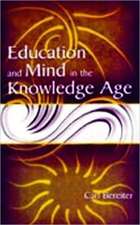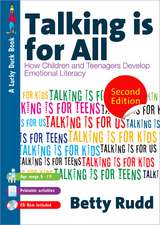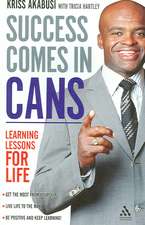New Perspectives Conceptual Change: Advances in Learning and Instruction S.
Autor Schnotz, Mario Carretero, Wolfgang Schnotzen Limba Engleză Hardback – 16 dec 1999
The book addresses four main themes: The interplay between the learner's naive knowledge based on everyday experience and new knowledge conveyed by schooling and formal instruction; Traditional cognitive views on knowledge acquisition and new socioconstructionist perspectives; Constraints on knowledge acquisition and modification within specific learning domains; Instructional aspects of conceptual change and suggestions for the design of learning environments and teaching processes which promote conceptual change.
Preț: 1083.55 lei
Preț vechi: 1407.20 lei
-23% Nou
Puncte Express: 1625
Preț estimativ în valută:
207.34€ • 217.02$ • 172.57£
207.34€ • 217.02$ • 172.57£
Carte tipărită la comandă
Livrare economică 31 martie-14 aprilie
Preluare comenzi: 021 569.72.76
Specificații
ISBN-13: 9780080434551
ISBN-10: 008043455X
Pagini: 348
Dimensiuni: 156 x 234 x 21 mm
Greutate: 0.66 kg
Editura: Emerald Group Publishing Limited
Seria Advances in Learning and Instruction S.
ISBN-10: 008043455X
Pagini: 348
Dimensiuni: 156 x 234 x 21 mm
Greutate: 0.66 kg
Editura: Emerald Group Publishing Limited
Seria Advances in Learning and Instruction S.
Cuprins
Preface. Cognitive, Developmental and Motivational Aspects. Conceptual change research: state-of-the-art and future directions (S. Vosniadou). The development of ontological categories: stable dimensions and changing concepts (S. Pauen). Motivational beliefs as resources for and constraints on conceptual change (P.R. Pintrich). Situational Aspects. Conceptual change and contextualization (O. Halldén). Systems of signs and conceptual change (T. Nunes). Concepts, cognition and discourse. From mental structures to discursive tools (R. Säljö). Knowledge, belief, and opinion: a sociologist's view of conceptual change (D. Kalekin-Fishman). Domain-Specific Aspects. Knowledge restructuring in an economic subdomain: banking (A.E. Berti). Conflicting data and conceptual change in history experts (M. Limón, M. Carretero). When change does not mean replacement: different representations for different contexts (J.I. Pozo et al.). Children's conceptions about the role of realworld knowledge in mathematical modelling: analysis and improvement (L. Verschaffel et al.). Instructional Aspects. Task-dependent construction of mental models as a basis for conceptual change (W. Schnotz, A. Preuß). Constraints on the effectiveness of diagrams as resources for conceptual change (R. Lowe). Computer-assisted instructional strategies for promoting conceptual change (J.A. Biemans). Conceptual change approaches in science education (R. Duit).














